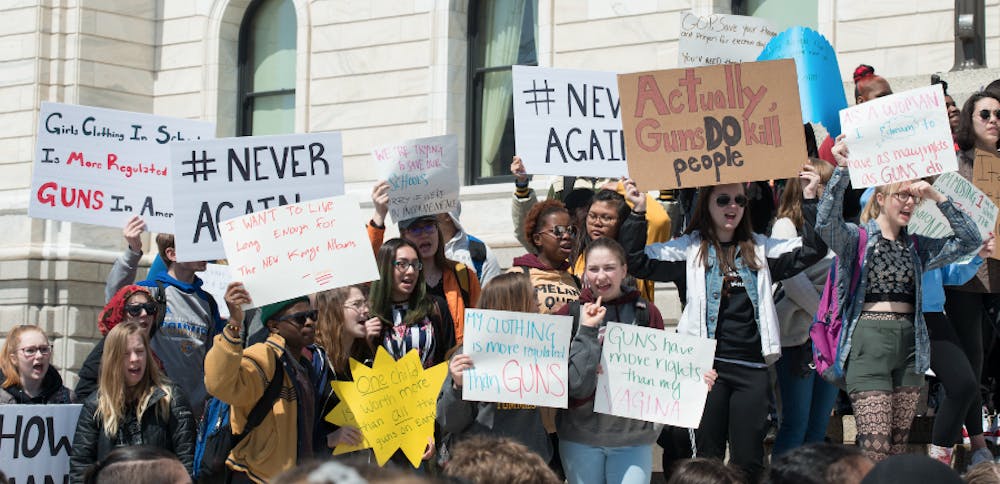By Corinne Coakley
Staff Writer
At times, the debate over gun violence and school shootings in the United States can feel far away, however, it all came awfully close to home this past Monday, April 3, when Rider University’s campus was sheltered in place for almost a full hour due to a potential active shooter threat. While it ended up being a “swatting incident,” the result of a prank call, it still left the community reeling.
This scare at Rider came just one week after the shooting at The Covenant School in Nashville on March 27 where six people were killed — three adults and three children. This was the deadliest shooting since the Uvalde massacre last May where 21 people were killed, 19 of them being children.
When I began writing this article, I really didn’t know what I even wanted to argue. It feels to me like everything that needs to be said has been said: Yes, we need more gun control in this country, extensive background checks and bans on assault rifles. Yes, we need more accessible mental health services for all people (although I am not a subscriber to the belief that it’s the person committing the crime over the weapon). We need to cut the financial ties between politicians and the NRA. We need far more than thoughts and prayers.
But we’ve heard all that so many times, and I worried if I wrote that kind of article, it would only make me (and readers) feel even more helpless. Another redundant article would only highlight the futility of the situation, the lack of change that has occurred since Columbine or Sandy Hook, the major mass shootings of our youth.
Instead, I’d rather turn to philosophy…
Let me set the scene: I’m in my Honors 203: Self-Interest, Justice and Revolution (Issues in Philosophy) class, taught by Professor Richard Kamber in the steamy building that is Bliss Hall.
In this class, we tackle “Plato’s Republic,” a full introduction to the ins and outs of philosophical thought and discussion. Throughout the bulk of this book, Plato, speaking as Socrates (his mentor), conducts a thought experiment along with other fellow philosophers: They create a hypothetical city-state.
They want to create the ideal city, the city with the most just citizens. The philosophers ask questions like: how should the citizens be educated? How will the citizens be kept safe? Who should rule? What is justice and how will it be instilled in the city population?
The philosophers decide that “reluctant rulers” are ideal; qualified rulers will rule because they recognize it as their duty, not for personal gains. Ruling will not be made into a profitable business, as this would pave the way for corruption.
Plato also weighs the different forms of governance: oligarchy, aristocracy, timocracy and democracy. Plato isn’t a fan of any of these forms, including our most beloved democracy. He argues that democracy breeds “disorderly individualism” and “social anarchy.”
At this point in class, Kamber directs the conversation to modern America and modern examples of disorderly individualism we see regularly, one of them being the avid defense of
the 2nd Amendment by a considerable portion of the nation.
Advocating for the preservation of the 2nd Amendment has now become associated with preserving freedom. As it stands, it seems the American definition of freedom is being able to own a military-grade weapon that can kill dozens of children in mere minutes. Freedom is hiding under desks in dark, locked classrooms, shrines decorated with flowers and teddy bears and miniature candles. Freedom is 132 mass shootings in one year. Freedom is our fate decided by politicians interested in profit instead of the wellbeing of their people.
The United States often considers itself an ideal country, home of the American Dream, because it values personal liberties above all else. But what if we chose wrong? What if when the founders sat down around a hypothetical conference table and discussed the formation of America, they picked individualism when they should’ve picked communalism or collectivism, individual freedoms over the common good? Would we be in this same, bloody mess had they chosen differently? Would Americans be 25 times more likely to die from gun violence than people in other high-income nations?
What my philosophy class has shown me is that every element of a society is significant and can mean the difference between that society’s success and failure. What I’m arguing in this Plato-inspired article, is that perhaps our definitions of justice and freedom are flawed, and the prioritization of the individual over the community misguided. Perhaps our most prized values are, well, wrong.
When little children are mowed down in classrooms with little reaction from politicians with the power to protect those children, one must wonder: how did it come to be that weapons are valued more than human life? Is the constant threat of murder the cost of freedom? And is that really freedom at all?
It’s time to return to the philosophical drawing board: Plato, rise from the dead and make us ideal.







